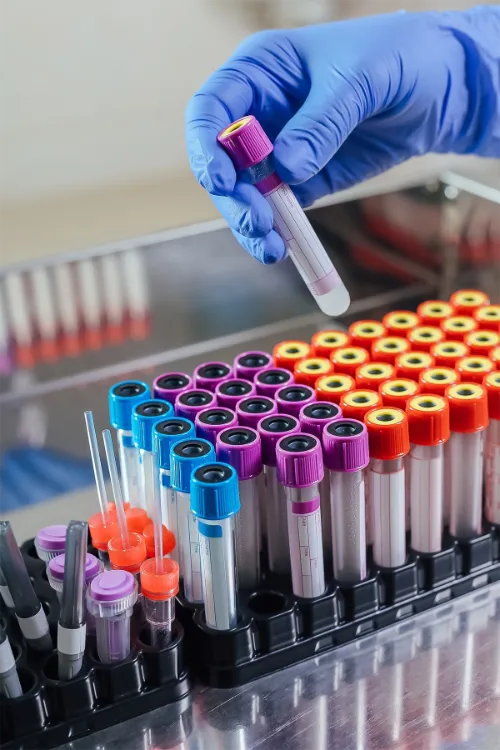Prostatitis
"It is necessary to perform the necessary diagnostic tests to confirm this disease with certainty".
DR. MARCOS TORRES
SPECIALIST. UROLOGY DEPARTMENT

What is prostatitis?
Prostatitis is an inflammation of the prostate gland that causes a series of symptoms characterised by voiding, sexual and perineal disorders to a greater or lesser extent, depending on the cause, whether it is infectious or non-infectious.
Prostatitis is usually caused by a bacterial infection of the prostate gland. Any bacteria that can cause a urinary tract infection can lead to acute bacterial prostatitis.
Some sexually transmitted diseases (STDs) can cause bacterial prostatitis. Acute prostatitis should be completely relieved with medication and minor changes in diet and behaviour. Acute prostatitis may recur or develop into chronic prostatitis.

Symptoms of Prostatitis
Urinary disturbances
These include dysuria (difficulty or pain when urinating), increased frequency of urination, urgency or urgency to urinate, painful urination and even acute urinary retention. These symptoms are common in inflammatory or infectious processes of the lower urinary tract.
Sexual symptoms
These manifest as decreased sexual desire, erectile dysfunction (total or partial loss of erection), painful or premature ejaculation, presence of blood in the semen (haematospermia) and infertility. These alterations may be due to the involvement of structures such as the prostate, seminal vesicles and vas deferens.
Localised or radiating pain
Perineal pain is one of the most common symptoms and may radiate to the pubis, lumbosacral region, scrotum, penis or inner thighs. This type of pain is usually persistent and bothersome, and is characteristic of many urethro-prostate-seminal conditions.
General symptoms in acute infections
In cases of acute prostatitis, the symptomatology is more specific and presents with fever, general malaise, severe dysuria, spontaneous perineal pain or pain during urination, and sometimes acute urinary retention. This combination of clinical signs helps to differentiate it from other less obvious forms of prostatic involvement.
Do you have any of these symptoms?
If you suspect that you have any of the above symptoms,
you should consult a medical specialist for a diagnosis.
What are the causes of prostatitis?
There are several theories:
- Obstructive theory: caused by a narrowing of the urethra and the neck or wall of the bladder.
- Intraductal flow theory: caused by part of the urine leaking into the prostate gland.
- Autoimmune theory: caused by a reaction of the immune system triggered by the bacteria themselves or the urine.
- Venous theory: caused by impaired venous return, e.g. due to haemorrhoids or varicocele.
- Infectious theory: caused by germs entering the prostate through the urethra. It could also occur via the bloodstream.
Who can suffer from it?
In men over 35 years of age, E. Coli and other common bacteria typically cause prostatitis.
Men aged 50 and older who have an enlarged prostate (benign prostatic hyperplasia) are at increased risk of prostatitis.
How is prostatitis diagnosed?
Diagnosis of prostatitis is based on clinical history, examination, fractionated urine culture, semen culture, ultrasound, blood tests (elevated PSA in acute prostatitis) and prostate biopsy in some cases of chronic prostatitis.
What are the causes of prostatitis?
Clinically, several prostatic syndromes can be distinguished and have been grouped in a classification by the US National Institute of Health (NIH Classification) as follows:
- Acute bacterial prostatitis: Acute infection of the prostate gland.
- Chronic bacterial prostatitis: recurrent urinary tract infection. Chronic prostatic infection.
- Chronic bacterial prostatitis/chronic pelvic pain syndrome: Perineal or pelvic pain (3 months minimum) with variable voiding or sexual symptoms without proven infection.
- Inflammatory chronic pelvic pain syndrome (leucocytes in semen, post-massage prostatic discharge or post-massage urination).
- Non-inflammatory chronic pelvic pain syndrome (no leukocytes in semen, post-massage prostatic discharge or post-massage urination).
- Asymptomatic inflammatory prostatitis: Evidence of inflammation in biopsy, semen, post-massage prostatic discharge or post-massage micturition in the absence of symptoms.

How is prostatitis treated?
In acute prostatitis, bactericidal antibiotics suitable for gram-negative bacteria, administered parenterally.
In chronic prostatitis, antibiotics that penetrate well into the prostatic tissue (liposoluble). They diffuse adequately to the prostatic fluid: tobramycin, netilmicin, trimethoprim, doxycycline, ciprofloxacin, phosphomycin and ceftriaxone among others. Treatment guidelines of 6 to 12 weeks.
Other adjuvant treatments: phytotherapy, alpha-blockers, muscle relaxants, 5-alpha-reductase inhibitors, anti-inflammatories, lifestyle changes.
What clinical trials do we have on Prostatitis?
The Department of Urology
of the Clínica Universidad de Navarra
The Department of Urology of the University of Navarra Clinic offers the patient a medical team, composed of first-rate professionals, and state-of-the-art diagnostic and therapeutic means such as the Da Vinci® robotic surgery.
The Department of Urology possesses the certificate of accreditation of the European Board of Urology, a reinforcement of the excellence of the service at the level of care, teaching and research, which in Spain only three hospital centers possess.
Diseases we treat:
- Prostate Cancer
- Kidney Cancer
- Bladder Cancer
- Testicular Cancer
- Benign prostatic hyperplasia
- Urinary Incontinence
- Renal Lithiasis
- Genitourinary Prolapses
- Pediatric Urology

Why at the Clinica?
- A team of top-level professionals trained in international centers.
- State-of-the-art technology for diagnosis and treatment.
- In 24-48 hours you can start the most appropriate treatment.














